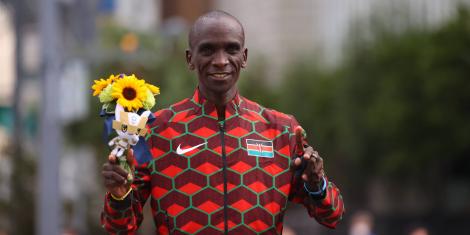
If there is one human who has defied all odds to stand tall and ‘reclaim what is his’, it has to be Eliud Kipchoge.
Five years ago, marathon world record-holder Eliud Kipchoge won the last event of the Rio Olympics. On Sunday in Sapporo, he did just the same in the sweltering heat to claim gold once again in the men’s marathon.
Kipchoge’s dominance in Rio started in the 36th kilometer when he broke away from the rest of the pack to win gold, this time round his decisive move came in the 31st kilometer. The 36-year-old built a strong lead over the rest of the runners to comfortably win the race in a time of 2:08:38, a margin of 1:02 ahead of Abdi Nageeya of the Netherlands.
"I think I have fulfilled the legacy by winning the marathon for the second time, back-to-back. I hope now to help inspire the next generation," said Kipchoge.
His latest triumph equalled the 1960 and 1964 champion Abebe Bikila of Ethiopia and East German Waldemar Cierpinski, the winner in Montreal in 1976 and Moscow in 1980, as a back-to-back winner at the Summer Games.
"It means a lot for me, especially at this time. It was really hard last year, with the Olympic Games postponed. I am happy for the local organising committee who made this race happen. It is a sign that shows the world we are heading in the right direction - we are on the right transition to a normal life."
Before the race, many athletics pundits barely gave ‘King Choge’ a chance in Sapporo especially after a dismal performance in the London marathon in April.
But Kipchoge seems to have answers to all the questions asked. On Sunday, he was taking turns in the lead with Colombian Jeison Alexander Suarez and Daniel do Nascimento of Brazil who even managed to share a ‘gota’ moment before the heattook toll on the South American.
As it happened
Little changed at 15 kilometres (46:03) where 2016 bronze medallist Galen Rupp of the US and Kipchoge's teammate Lawrence Cherono were also chipping in with the pacing duties.
The field was beginning to spread out by the time Stephen Mokoka of South Africa reached the halfway point in 1:05:13, with 23 runners still within three seconds of the lead. At the head of the pack, Kipchoge was the picture of calm and cool, and was playful too, as he exchanged a fist bump with Brazil's Daniel do Nascimento as they continued to take turns at the front.
The first big break came in the 27th kilometre when the lead pack was reduced to 12, but with Kipchoge still firmly dictating the proceedings. Rupp was still there, along with Belgian Bashir Abdi and Dutchman Abdi Nageeye, Kipchoge's teammates Cherono and Kipruto, and Alphonce Felix Simbu of Tanzania.
By 30km (1:32:31) the pack further dwindled to eight, but that apparently wasn't to Kipchoge's liking. Less than a kilometre later, he injected a surge that quickly created considerable daylight between him and the remaining chase pack. He then began to pour it on, building a 27-second lead through 35 kilometres (1:46:59). He extended it to more than a minute five kilometres later. The only company he had in the waning moments were the substantial crowds that turned out to watch the race.
Behind him, Cherono, Ayad Lamdassem of Spain, and training partners Abdi and Nageeye battled it out for the remaining two podium spots. Nageeye won that battle, crossing the line in 2:09:58, two seconds clear of Abdi.
“I said so many times I wanted a top three, but I never made it. So today I was just focusing. Focus, focus, focus,” said Nageeye, who finished 11th in Rio. “When I reached 39km I just knew (I would win a medal). I was feeling really easy with three kilometres to go. I knew I had just nine minutes to run. It is unbelievable.”
“I always believed in myself,” he continued. “I was a nomad, I packed my bags and trained in France, America, Ethiopia, Kenya. To stand on the podium with Eliud Kipchoge, the greatest of all time – It is amazing.”
Abdi too was a believer. Without Nageeye, he said, it would be unlikely that he’d finish on the podium.
"The last three kilometres was very hard because I had cramp,” Abdi said. “But my training partner motivated me. I am really happy he finished in second place, and I'm really happy with the bronze. He said, 'you must go.' If he was not there today, it would have been a difficult last three kilometres."
Cherono was next, two seconds back in 2:10:02 with Lamdassem clocking 2:10:16 for fifth. Suguro Osako closed well to finish sixth and the first Japanese in 2:10:41. Further back, Rupp was eighth in 2:11:41.
Tachlowini Gabriyesos, the first refugee team member to achieve an Olympic qualifying standard, performed well, clocking 2:14:02 to finish 16th.
Of the 106 runners who started only 76 finished.
Additional reporting by World Athletics
